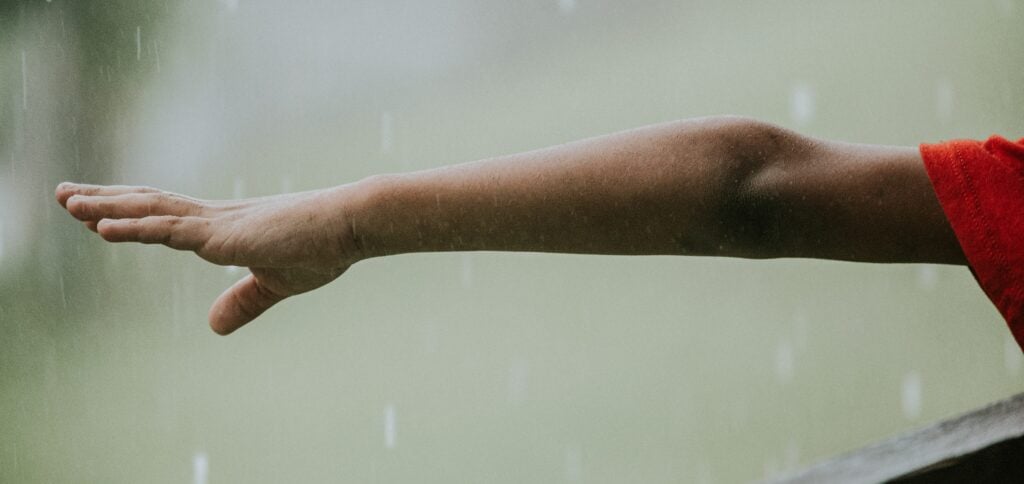Check out this cute girl who enchanted us on TikTok:
@anafrezende no, being in the rain does not CAUSE a cold. As it is a viral infection, only these pathogens, disease-causing microorganisms, can cause the condition.#Rain shower #maternity #creatingmemories #fy #fyp #foryou #foryoupage ♬ Ruth B Dandelions Hihihiaaaauuu (Remix) – FAITAH NADA
This video has been viewed more than 1,6 million times and has received more than 1.500 comments, both from people supporting the initiative to play in the rain and from people criticizing it.
ADVERTISING
According to pediatrician Linus Pauling Fascina, medical manager of the Maternal and Child Department at Hospital Israelita Albert Einstein, the mother, Ana Carolina, is right: Showering in the rain does not cause flu or colds. In practice, explains the doctor, these diseases are no different, as they are the same viruses that cause local irritation and systemic effects, such as body pain, weakness and malaise.
“Rain showers don’t cause the flu. No wind, no ice cream. What causes flu are several types of respiratory viruses that have in common sneezing, coughing, runny nose and nasal congestion, as well as sore throat. Cold, snow, ice water and rain in themselves do not cause flu, otherwise people living in cold countries areariaI’m always sick and that doesn’t happen”, explained the pediatrician.
Myth and misinformation
According to Fascina, this belief is old and misinformation exists because contact with temperatures lower than that of the human body triggers these sneezing and coughing reflexes. But then, why does the nose tend to run when exposed to these situations?
ADVERTISING
“In these cases, the nose runs due to a reaction to the cold and not due to an infection. When we get rained on or go out in the cold, our body reacts locally in the nasal mucous membranes, causing vasoconstriction [decreased blood flow]. Thus, the local cells understand that they are more dehydrated and release mucus to protect against the loss of local heat and humidity, resulting in a runny nose”, explains Fascina.
The same happens with coughing after exposure: it is nothing more than a defense reflex to keep the respiratory areas moist and warm.
Fascina emphasizes, however, that these reactions should only last as long as exposure to cold or rain. “When returning to the appropriate thermal environment, this reaction decreases and tends to disappear quickly. When a person exposes themselves repeatedly, it can feel like it’s an ongoing thing,” she said. “If you combine it with a viral situation, it may seem like the rain was to blame.”
ADVERTISING
The pediatrician issues another warning: The biggest risks of being in the rain are being struck by lightning (especially when out in the open), slipping in puddles of water and getting hurt, getting contaminated by dirty sewage water, among other things.
Vaccination is important
There is a fundamental measure to avoid the flu: vaccination. According to Fascina, immunization is recommended for all age groups, including pregnant women, as it helps maintain health during autumn and winter, when people tend to spend more time in closed and overcrowded environments.
“This period helps the spread of viruses when we cough, sneeze or simply stop washing our hands when touching surfaces. These are the biggest sources of contamination. Therefore, vaccinate your child against the flu”, said the pediatrician.
ADVERTISING
The National Flu Vaccination Campaign began in 10th of March and continues until the end of May through the Unified Health System (SUS) with the following priority groups:
- children from six months to six years of age;
- pregnant women;
- postpartum women;
- indigenous people;
- health workers;
- elderly people over 60 years old;
- teachers;
- people with permanent disabilities;
- security and rescue forces professionals;
- truck drivers and urban passenger road transport workers; port workers;
- prison system employees and the population deprived of liberty;
- In private clinics, the vaccine is also offered to other age groups.
Source: Einstein Agency
@curtonews Taking a “rain shower” does not cause a cold or flu. This is a myth! 🌧️
♬ original sound – Curto News
Read also
Receive news and newsletters do Curto News by Telegram e WhatsApp.




